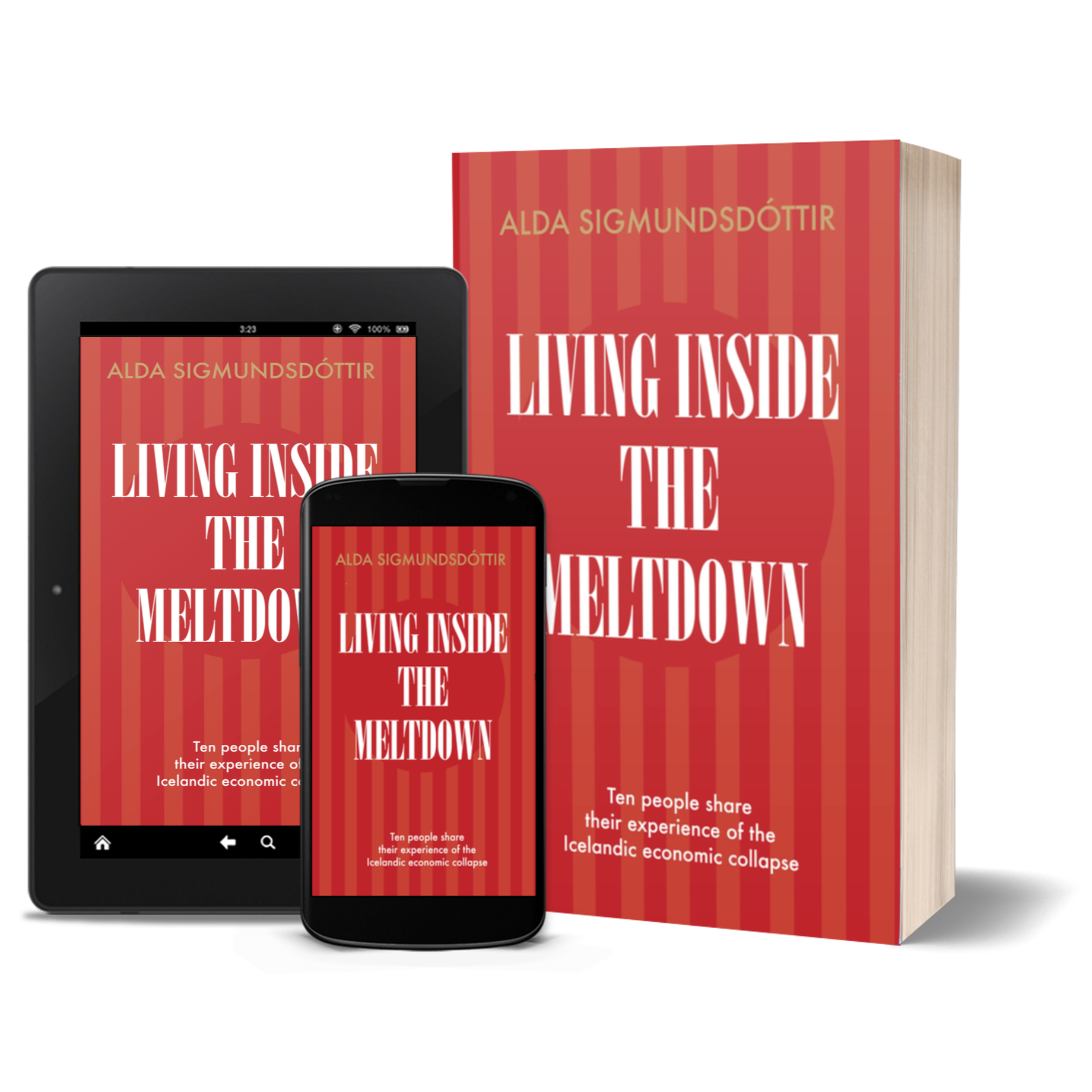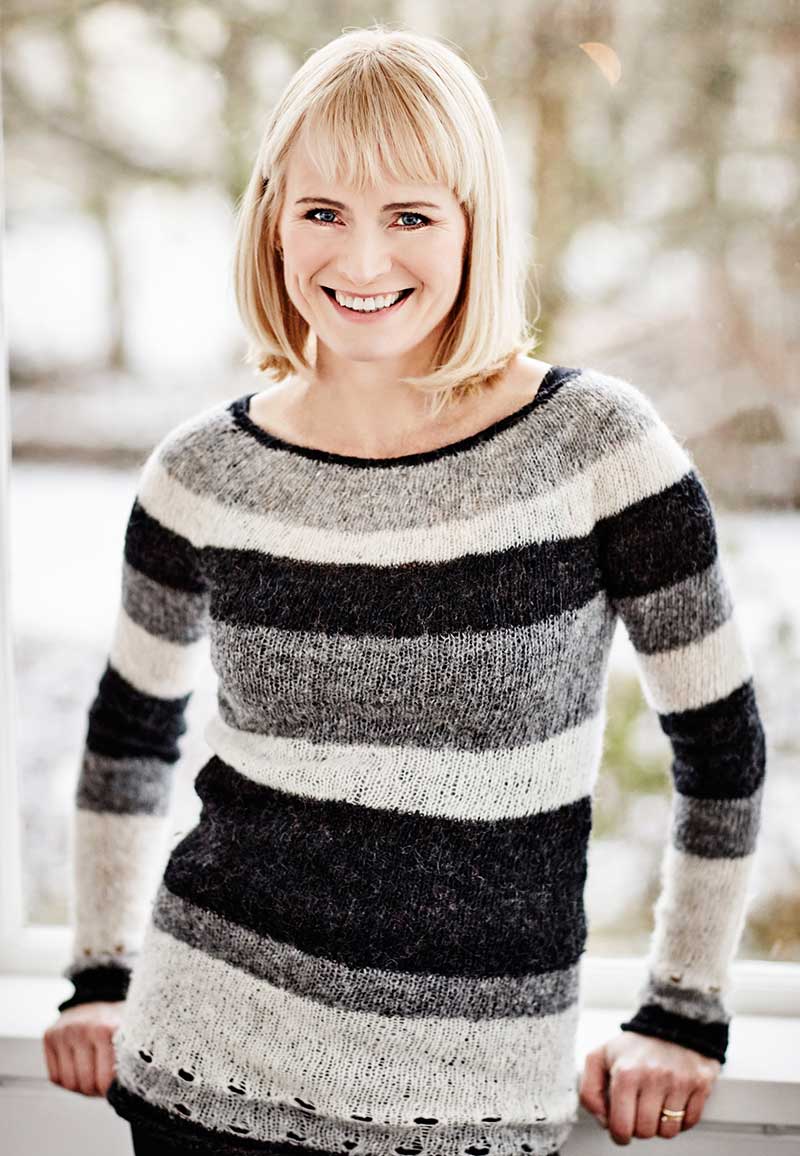Living Inside the Meltdown
Ten people share their experience of the Icelandic economic collapse
In October 2008, Iceland went from being one of the wealthiest countries in the world to being one of the poorest, within the space of some two weeks. During those sensational few days, regular citizens stood by helplessly and watched as Iceland’s three large commercial banks collapsed and Iceland’s currency, the króna, plummeted in value, eventually becoming worthless outside of Iceland.
Living Inside the Meltdown is the first published collection of interviews with ordinary people about their experiences of Iceland’s economic meltdown.

Alda Sigmundsdóttir:
“I was curious to know how a police officer felt who had to take a stand against protesters during the ensuing political crisis, which culminated in the Kitchenware Revolution. Did sympathize with them, or was he opposed? Did he want to join the protesters? And looking back, how does he view this time?
I was also curious to know how someone who worked in a bank had felt going to work on the day the bank melted down. What was the atmosphere like? What was her workday like?
And what about those people we had heard about who were students abroad when currency controls were suddenly implemented and who were cut off from their financial source? Some of them had small children – how did they cope in a foreign country with no access to money?
What about small business owners, who suddenly had to pay for orders upfront? And what was it like for foreigners who lived in Iceland and who perhaps had a limited understanding of what was going on? Were they afraid? Where did they get their news from?
I found these answers, plus many more that I wasn’t even looking for, in the interviews.”
Living Inside the Meltdown is a book for everyone who cares about Iceland and is interested in Icelandic affairs. Available as a paperback and ebook from your nearest digital store. Get your copy now!
Book excerpt
The Crisis Has Made Icelanders Less Greedy
Nuno Valentim and Jorge da Silva Veiga are both from Portugal. Jorge came to Iceland in 2000 to work on the construction of the Smáralind shopping mall. Nuno and his wife came in 2007 at the suggestion of a friend. They were both working as manual labourers when the collapse happened – Nuno as a house painter, and Jorge as a construction worker.
NUNO: I came to Iceland in April 2007. A friend of mine was living here and said Iceland was great. He told me we could have a very nice life here. In Portugal I had my own company and he asked me: What the hell are you doing putting lots of hours into a business that is almost bankrupt? I was earning the same amount as I could earn working at just a normal job in Iceland. So my wife and I decided to take a risk and try something new.
Of course, at that time the exchange rate was a little different from what it is now.
Our first jobs in Iceland were working in a fish processing factory in Hafnarfjörður. It took us one day to find those jobs. We began by staying with my friend, renting a room in his flat. We had brought some money with us, enough to get us started.
Soon afterwards we moved from my friend’s place and rented our own small apartment. Our landlord owned a house painting company and he offered me work. I thought, sure, why not. So I learned how to paint walls and do all sorts of decorating. My wife saw an advertisement in the paper for a support worker at a pre-school in Garðabær. She applied and got the job.
My landlord, as it turned out, was a guy who liked to hire people to work black – illegally. I discovered when I went to the tax office that he had been deducting taxes from me but not paying them to the government. So I had no security. For example, I could not have collected unemployment if I had needed to, and if I had become sick I would have been in trouble. So there was a scene – I quit working for him and immediately moved out of the apartment. Thankfully we found another place to rent in Hafnarfjörður. It was very difficult to find something to rent at that time.
By September 2008, when the banks started running into trouble, I had changed jobs and was working for a larger house painting company. I remember the collapse very well. The first bank, Glitnir, went down on a Monday. Everybody was listening to the radio. I went to the office to speak to my boss about what might happen. I took one look at his face and said: This is not good. And he answered: No, it is not good.
I knew the economy was not all right. The big fluctuation in the exchange rate was the first thing we noticed. I was sending money home to Portugal to pay off some debts so I was watching the exchange rate very carefully. But I was certainly not expecting a collapse. I mean, we’ve had these sorts of economic problems in Portugal for the last 50 years. We’re used to the crisis thing. But I would never in a million years have thought all the banks would collapse.
So Glitnir went down, and then the next week, both Landsbanki and Kaupthing collapsed in the same week.
My wife and I had bought an apartment in summer 2008. When the collapse happened I was renovating it – painting the walls, putting in flooring, things like that. So my first thought when the collapse happened was, I’ve bought this apartment so we’re stuck in Iceland. We couldn’t just return the apartment. We had to stay and fight.
Around the middle of October 2008 we started hearing rumours that the company I worked for was in trouble. It was without credit lines, had lost many contracts and would have to lay off a lot of people. I wasn’t too worried, though, because my boss had told me that I would be kept on. I was a hard worker, I had my own car, put everything in the car and went out to jobs on my own. But then suddenly everyone was being laid off and my boss told me he was really sorry but he couldn’t keep me on. This happened on the same day that we were moving into our new place. I had all my furniture in the back of the car and was transporting it to my new place when my boss called and told me I was fired. I went to pick up my termination letter with the furniture still in the back of my car. It was the hardest moment of my life.

Reviews
About the author
Alda Sigmundsdóttir is a writer, and occasional journalist. She runs her own independent press, Little Books Publishing, based in Reykjavík, Iceland.
Alda is the author of ten books, each of which explores an aspect of Icelandic culture or society. Her two latest books, The Little Book of the Icelanders at Christmas and The Little Book of Days in Iceland, are about the Icelanders’ enthusiasm for the Yuletide season, and Iceland’s special seasonal events and holidays, respectively. Alda is active on social media, and may be found on Facebook, Twitter and Instagram.
Our other Little Books
Did you think Living Inside the Meltdown was our only title? Think again! We publish numerous books about Iceland, the Icelanders, and Icelandic culture and affairs. Click the button to see our selection of wonderful Little Books.


